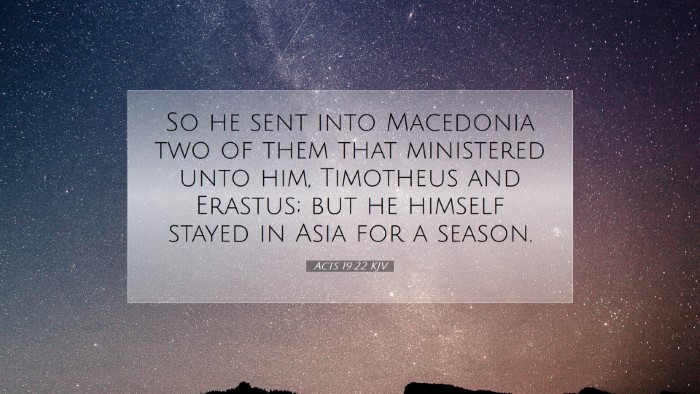Commentary on Acts 19:22
verse context: Acts 19:22 reads: "So he sent into Macedonia two of his helpers, Timothy and Erastus; but he himself stayed in Asia for a time." This crucial passage occurs at a significant juncture in the Apostle Paul's missionary journey. It reflects his strategic planning and the collaborative nature of early Christian ministry.
Introduction
Acts 19 narrates the undertakings of Paul in the city of Ephesus, a hub of commerce and spirituality, where he faced both substantial success and intense opposition. In verse 22, we see the Apostle making calculated decisions that reflect his pastoral strategy. Scholars and theologians can extract various principles related to leadership, teamwork, and mission strategy from this verse.
The Leadership of Paul
Matthew Henry remarks on Paul's leadership style as one marked by a deep sense of responsibility and foresight. His decision to send Timothy and Erastus into Macedonia signifies his understanding of the need to cultivate emerging church communities while ensuring that Ephesus remained attended to.
- Strategic Division of Labor: Paul illustrates the importance of delegation. By sending out Timothy and Erastus, he ensures that the work does not stall and that new initiatives are pursued.
- Importance of Local Leadership: By appointing Timothy, a leader known to the churches, Paul also brings in stable leadership that resonates with the local believers.
The Role of Timothy and Erastus
Albert Barnes emphasizes the significance of choosing Timothy and Erastus for this mission. Timothy, having spent time with Paul, is well equipped for the challenges he would face in Macedonia.
- Timothy's Qualifications: As a younger apostolic figure, Timothy embodies both wisdom and energy, combining the qualities necessary for engaging diverse congregations.
- Erastus' Importance: His presence as mentioned in other parts of scripture indicates that he held a position of some influence, possibly as a city treasurer, thus illustrating the importance of connections within local communities.
Staying in Asia
Paul's decision to remain in Asia during this critical time demonstrates his commitment to the work already established in Ephesus. Adam Clarke highlights that this choice allowed Paul to deepen his ministry efforts and address the challenges arising within that burgeoning church.
- Stability and Continuity: By staying, Paul provides continuity in leadership, thereby fostering an environment conducive to growth.
- Addressing Local Needs: The problems in Ephesus warranted his presence; by not leaving, Paul models a commitment to the pastoral role that necessitates being present during times of trial.
Theological Implications
The decision-making process illustrated in this verse can help guide pastors and leaders today. There are several theological principles evident in this choice:
- Collaboration in Ministry: The early church model encourages collaboration and support among leaders. The church today can learn from this and foster communal engagement.
- Prayerful Decision Making: The Apostle's actions suggest reliance on prayer and divine guidance when undertaking ministry decisions.
Conclusion
Acts 19:22 reveals not only the operational dynamics of early church leadership but also a model for contemporary ministry. The interaction between sending and staying underscores the reality that successful ministry involves a balance of outreach and sustained discipleship. This passage encourages pastors, students, and theologians to reflect on their approach to ministry, particularly the ways in which they delegate responsibilities and remain present in their communities.
As leaders engage in the demanding work of ministry today, they can draw inspiration from Paul, Timothy, and Erastus, contemplating how to best fulfill their calling and shepherd the flock entrusted to their care.


